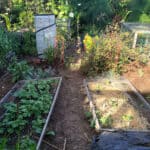Spring has sprung, so now is a great time to plant vegetables from seed. With help from Alameda’s free seed libraries, you can experience the joy and miracle of watching edible plants sprout from tiny seeds, save money, and develop food independence.

Where to get free seeds
Alameda Backyard Growers (ABG) launched its Seed Library project in July 2020 with a single box on San Jose Avenue in response to pandemic-era resource shortages. Now they host five free Seed Libraries at locations around town, and the Alameda Free Library has a substantial seed collection at the main branch as well.
ABG hosts little seed libraries at five locations in Alameda:
- 305 Santa Clara Ave. (West End).
- 1125 Morton St. (Central Alameda).
- 1827 St. Charles St. (Central Alameda).
- 2829 San Jose Ave. (East End).
- 16 Cove Rd. (Bay Farm).
ABG little seed libraries offer six kinds of seeds from which to choose. There will always be vegetable seeds, and there may be herbs as well. Choose up to six packs of seeds monthly, but please take only what you will actually grow.
The Alameda Main Library, located at 1550 Oak St., has the most extensive collection of free seeds, including vegetables, herbs, and flowers. Packets typically contain 24 seeds, although there are as few as six for some plants, such as zucchini. If you have excess newly purchased seeds, please consider donating them to the library so others can enjoy them.
The Main Library also has a small selection of gardening tools available for loan in the Tool Lending Library on the second floor, made possible by a grant from the Bay Area Library and Information System Innovation Fund Program BALIS, with the assistance of Ploughshares Nursery.


What to grow—and when
The Library’s Green Thumbs, Green Minds program maintains binders of information, including a Planting Calendar that tells you what to grow, either from plants or seeds, at different times of the year, and a Plant Index that tells you how easy or difficult different vegetables and herbs are to grow.
The Planting Calendar for March and April reveals that good plants to grow from seed at this time of year include beets, beans, carrots, collards, lettuce, onions, peas, potatoes, radishes, and Swiss chard, among others.
Sunlight is an essential consideration. You can grow herbs with just two to four hours of sun. Although Mediterranean herbs do love sun, they’ll grow in less-than-optimal light—you just won’t get as many leaves as you would with more sunshine. Herbs that tolerate partial sun or shade include mint, chives, lemon balm, dill, cilantro, and parsley.
With four hours of sunlight per day, you can grow leafy greens such as lettuce, arugula, and spinach, although they’ll grow to their full potential with closer to five or six hours of sun exposure.
With six to eight hours of sunlight, you can easily grow root crops such as carrots, radishes, and beets. And with eight-plus hours of sunshine, you can plant just about any vegetable, as long as you get the timing right with the growing seasons.
How to grow vegetables from seeds
If you’re new to growing vegetables from seeds, Alameda Backyard Growers has you covered with information for the newbie, such as the above YouTube video. Many vegetables work best when grown indoors until they sprout into small plants for transplanting outdoors. However, you should plant seeds for root vegetables, such as radishes and carrots, directly into the ground.
Generally, you want to plant in loose soil mixed with organic matter. Organic matter can come from purchased planting mix, homemade compost, or free compost from the Alameda Compost Hub.
Start small. Gardening takes practice and requires regular watering, weeding, and harvesting. It’s better to limit yourself to a few vegetables and herbs in the first year and enjoy the process rather than to overwhelm yourself.

Why grow food from seeds?
Growing your own food benefits your diet and health. Vegetables and herbs contain the most nutrition at the moment you pick them. The longer they’re off the plant, the more nutrients are depleted. Gardening is good exercise and people tend to breathe more deeply when outside.
Veggie gardens make you more immune to fluctuations in food prices, making you more self-sufficient. While you may spend on startup costs for planters and soil, you’ll save by growing vegetables and herbs that you use frequently or are expensive to buy. Fresh herbs, in particular, are costly in the grocery store. You’ll stretch your dollar even further if you freeze or preserve your excess. This can be as simple as storing bags of cherry tomatoes in the freezer.
Veggie gardens also support local pollinators, as bees and butterflies happily visit blooming plants, and they reduce your carbon footprint as you rely less on foods that have traveled far distances.
The Green Thumbs, Green Minds program notes that seeds are “lent to you at no financial cost, and they are priceless… growing plants from seeds is a gift. When you participate in the seed library, you create a culture of sharing and abundance.”
Contributing writer Karin K. Jensen covers boards and commissions for the Alameda Post. Contact her via [email protected]. Her writing is collected at https://linktr.ee/karinkjensen and https://alamedapost.com/Karin-K-Jensen.



